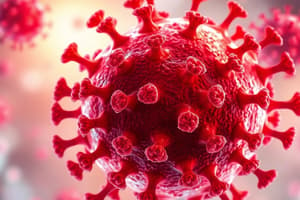Podcast
Questions and Answers
What are the different categories of inflammation?
What are the different categories of inflammation?
Acute and chronic inflammation
What are the two main types of cell injury?
What are the two main types of cell injury?
Reversible and irreversible cell injury
What are the four types of hypersensitive reactions?
What are the four types of hypersensitive reactions?
Type I, Type II, Type III, and Type IV
What is the main difference between acute and chronic inflammation?
What is the main difference between acute and chronic inflammation?
What is an example of a Type I hypersensitive reaction?
What is an example of a Type I hypersensitive reaction?
What is the main cause of irreversible cell injury?
What is the main cause of irreversible cell injury?
What is the role of the immune system in inflammation?
What is the role of the immune system in inflammation?
What is the difference between Type II and Type III hypersensitive reactions?
What is the difference between Type II and Type III hypersensitive reactions?
What type of immune response involves B lymphocytes and T lymphocytes?
What type of immune response involves B lymphocytes and T lymphocytes?
What is the characteristic of the innate immune response?
What is the characteristic of the innate immune response?
What is the difference between innate and adaptive immune responses?
What is the difference between innate and adaptive immune responses?
What type of cells are involved in the adaptive immune response?
What type of cells are involved in the adaptive immune response?
What is the purpose of the adaptive immune response?
What is the purpose of the adaptive immune response?
What is the primary function of physical barriers in the immune system?
What is the primary function of physical barriers in the immune system?
Which type of cells are involved in the non-specific defense mechanism?
Which type of cells are involved in the non-specific defense mechanism?
What is the role of chemical mediators in the immune system?
What is the role of chemical mediators in the immune system?
What is the primary function of the non-specific defense mechanism?
What is the primary function of the non-specific defense mechanism?
Which of the following is an example of a non-specific defense mechanism?
Which of the following is an example of a non-specific defense mechanism?
What is the first line of defense against foreign bodies and microorganisms?
What is the first line of defense against foreign bodies and microorganisms?
What is the role of the immune system in maintaining overall health?
What is the role of the immune system in maintaining overall health?
What is formed when an antigen combines with an antibody?
What is formed when an antigen combines with an antibody?
What is the immune system's 'double-edged sword'?
What is the immune system's 'double-edged sword'?
What is the term for the defense mechanism that can be injurious to the human body?
What is the term for the defense mechanism that can be injurious to the human body?
Flashcards are hidden until you start studying
Study Notes
Immune System
- Involves two types of lymphocytes: B cells (B lymphocytes) and T cells (T lymphocytes)
Types of Immunity
- Non-specific immunity: response is antigen-independent, immediate maximal response, no antigen-specific immunity, and no immunologic memory
- Specific immunity: response is antigen-dependent, lag time between exposure and maximal response, antigen-specific immunity, and immunologic memory
Organs and Cells of the Immune System
- Definition: tissues and organs where immune cells develop, mature, and produce an immune response
- Examples of organs:
- Bone marrow: where immune cells are produced
Hypersensitivity Reactions
- Mediated by IgE binding to mast cells, resulting in the release of histamine and other inflammatory mediators
- Symptoms: itching, redness, swelling, and respiratory distress
- Examples of diseases:
- Systemic lupus erythematosus (SLE)
- Rheumatoid arthritis
Inflammation
- Mechanism: delayed response
- Mediated by T lymphocytes
- Types of inflammation:
- (not specified)
- Types of cell injury:
- (not specified)
- Types of hypersensitive reactions:
- (not specified)
Innate Immune Response
- Provides the first line of defense against pathogens
- Comprises physical barriers (skin and mucous membranes), cellular components (neutrophils and macrophages), and chemical mediators (e.g. NK cells)
Adaptive Immune Response
- Activated when the innate immune response is insufficient
- Involves B lymphocytes (B cells) and T lymphocytes (T cells)
Immune System Functions
- Prevents infections
- Eliminates cancer cells
- Promotes tissue repair and regeneration
- Plays a critical role in maintaining overall health
Immunity and Immunopathology
- Immunity is a defense mechanism, while immunopathology is the injury caused by the immune response
- Immunopathology is a 'double-edged sword', as it can be both beneficial and harmful to the human body
Key Terms
- Antigen (Ag): a foreign substance that triggers an immune response
- Antibody (Ab): a protein produced in response to an antigen
- Ag-Ab Complex: the binding of an antigen to an antibody
Studying That Suits You
Use AI to generate personalized quizzes and flashcards to suit your learning preferences.



